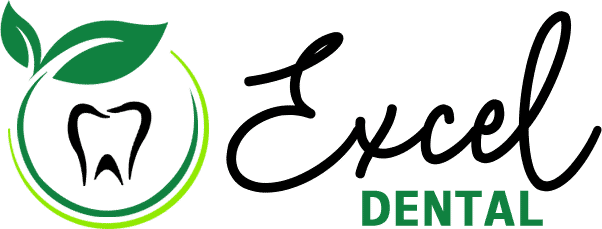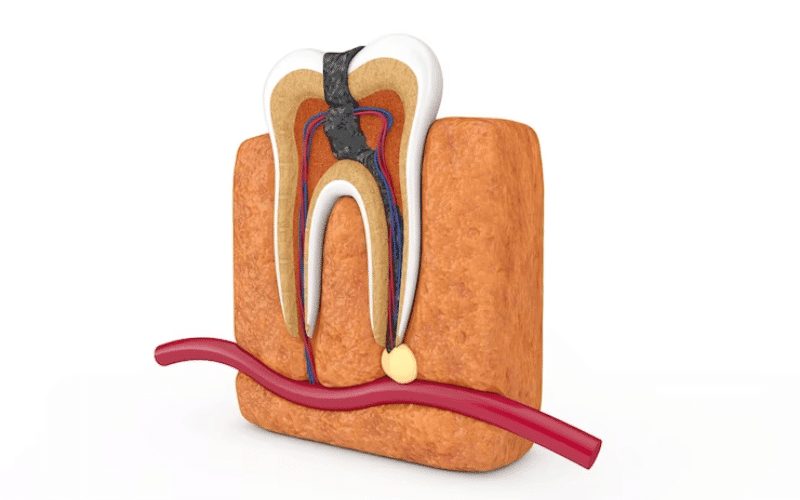Laser dentistry employs focused light beams to treat various dental issues, offering precise and minimally invasive procedures. In root canal treatments, lasers clean and disinfect the canal system by removing bacteria and infected tissue. This technology promotes faster healing, reduces discomfort, and minimizes the need for traditional drilling and anesthesia.
Laser energy can also seal the root canals more effectively, reducing the risk of reinfection. Laser dentistry enhances precision, comfort, and outcomes in root canal procedures, making it a valuable tool in modern dental practice.
Understanding Root Canal Treatment
A root canal is a dental procedure to treat infections or damage within the tooth’s pulp, where nerves, blood vessels, and connective tissue are housed. It involves removing the infected or inflamed tissue, cleaning, disinfecting, and shaping the root canal system, and then filling and sealing it to prevent further infection.
Root canals are necessary when the pulp becomes infected due to deep decay, repeated dental procedures, or trauma. The infection can spread without treatment, causing severe pain, abscess formation, and eventual tooth loss. Root canals save teeth from extraction and alleviate associated pain and discomfort.
What is Laser Dentistry?
Laser dentistry involves using focused light beams to perform various dental procedures. This advanced technology offers precise and minimally invasive treatment options for various dental issues. Lasers can be used for procedures such as cavity detection, gum disease treatment, gum reshaping, teeth whitening, and even surgical procedures like gum surgery and root canals.
Laser dentistry often results in faster healing, reduced discomfort, and less need for anesthesia than traditional methods. It’s an innovative approach that continues to revolutionize the field of dentistry by improving patient outcomes and experiences.
How is Laser Dentistry revolutionizing root canal treatment?
1. Precision: Laser dentistry allows for exact treatment during root canals. The focused light beams can target infected tissue and bacteria accurately, minimizing damage to surrounding healthy tissue.
2. Minimally Invasive: Laser root canals are less invasive than traditional methods involving drills and files. This reduces patient discomfort, faster healing times, and less post-operative pain.
3. Effective Disinfection: Lasers effectively sterilize the root canal system by killing bacteria and removing infected tissue. This reduces the risk of reinfection and improves the long-term success rate of the root canal procedure.
4. Improved Seal: Laser energy can create a better seal within the root canals, preventing bacteria from re-entering and causing further infection. This enhances the durability of the restoration and reduces the likelihood of future complications.
5. Patient Comfort: Laser dentistry offers a more comfortable experience for patients undergoing root canal treatment. The procedure is typically quieter, involves less vibration, and often requires minimal to no anesthesia, leading to a more pleasant dental visit overall.
Comparison With Traditional Root Canal Treatment
Laser root canal treatment offers several advantages over traditional methods. Unlike conventional techniques that use drills and files, lasers are minimally invasive, resulting in less discomfort and faster healing times. Lasers precisely target infected tissue, reducing damage to surrounding healthy areas.
They also effectively disinfect the root canal system, minimizing the risk of reinfection. Laser energy creates a superior seal within the root canals, enhancing the long-term success of the procedure.
Additionally, patients often experience less post-operative pain and require minimal to no anesthesia during laser treatment, leading to a more comfortable dental experience overall compared to traditional root canal procedures.
The Process of Performing a Root Canal With Laser Dentistry
1. Diagnosis and assessment: The dentist examines the tooth and evaluates X-rays to determine the need for a root canal. They assess the extent of infection or damage to the pulp inside the tooth.
2. Anesthesia and isolation: Local anesthesia is administered to ensure the patient’s comfort. The area around the tooth is isolated with a rubber dam to keep it dry and free from saliva.
3. Access preparation using lasers: A laser creates a small opening in the tooth’s crown, providing access to the root canal system while minimizing damage to surrounding tissue.
4. Cleaning and shaping of the root canal system: Laser energy and specialized instruments are used to remove infected tissue and shape the root canal to facilitate effective cleaning.
5. Disinfection with laser energy: Laser light is directed into the root canal to kill bacteria and sterilize the area thoroughly, reducing the risk of reinfection.
6. Filling and sealing the canal: The cleaned and disinfected root canal is filled with a biocompatible material, typically gutta-percha, and sealed to prevent bacteria from entering and causing further infection.
Benefits of Laser Root Canal Treatment
1. Minimal discomfort and pain: Laser root canal treatment is less invasive, reducing discomfort during and after the procedure. Patients often experience less pain than traditional methods, providing a more comfortable dental experience overall.
2. Reduced risk of infection: Laser energy effectively disinfects the root canal system, killing bacteria and reducing the risk of reinfection. This enhances the procedure’s success rate and improves overall oral health outcomes.
3. Preservation of healthy tooth structure: Laser technology allows for the precise removal of infected tissue while preserving healthier tooth structures. This helps maintain the integrity and strength of the tooth, reducing the need for further dental work in the future.
4. Faster healing and recovery times: Laser root canals promote faster healing due to their minimally invasive nature. Patients typically experience shorter recovery times and can return to normal activities sooner than traditional methods.
5. Long-term success rates: Laser root canals have been shown to have high long-term success rates in effectively treating root canal infections. The likelihood of future complications and reinfection is minimized by thoroughly disinfecting the root canal system and sealing it properly.
Safety Measures in Laser Dentistry
1. Eye protection: Both patients and dental professionals must wear appropriate eye protection to shield their eyes from potential laser exposure, which can cause damage or injury.
2. Patient education: Informing patients about laser procedures, potential risks, and safety measures ensures their cooperation and understanding during treatment.
3. Operator training: Dentists and dental staff should undergo comprehensive training in laser safety protocols, including proper handling and operation of laser equipment.
4. Controlled environment: Laser procedures should be conducted in a controlled environment with adequate ventilation to minimize the risk of inhaling smoke or aerosols generated during treatment.
5. Regular maintenance: Regular maintenance and calibration of laser equipment are essential to ensure proper functionality and safety during procedures. This includes routine checks for any malfunctions or issues that may compromise patient safety.
Wrap Up!
In conclusion, laser dentistry offers a safe and effective approach to dental procedures with minimal discomfort and enhanced outcomes. Future advancements in laser technology promise even greater precision and efficiency in treating various dental issues. Patients are encouraged to embrace modern approaches to dental care, benefiting from reduced pain, faster recovery times, and improved long-term oral health.
Embrace the future of dentistry with lasers – opt for precision, comfort, and superior results. Choose laser dentistry for a brighter, healthier smile. Schedule your dental appointment today with Missouri City Dental – Excel Dental.


